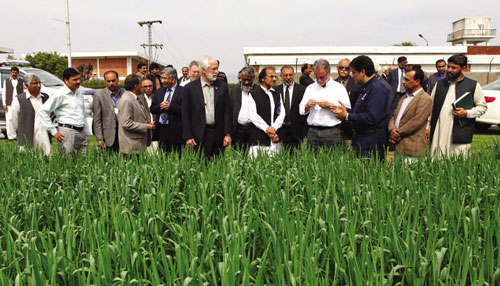 Pakistan ushered in a new era of agricultural research earlier this month when the Ministry of Food Security and Research, CIMMYT, USAID, the Pakistan Agricultural Research Council (PARC), and key agricultural leaders from throughout Pakistan gathered in Islamabad on 08 March 2013 to announce the Pakistan ‘Agricultural Innovation Program’ (AIP). This $30 million project seeks to revitalize the contribution of science-supported innovation to the economic growth of Pakistan’s agricultural sector by utilizing the Agricultural Research for Development paradigm.
Pakistan ushered in a new era of agricultural research earlier this month when the Ministry of Food Security and Research, CIMMYT, USAID, the Pakistan Agricultural Research Council (PARC), and key agricultural leaders from throughout Pakistan gathered in Islamabad on 08 March 2013 to announce the Pakistan ‘Agricultural Innovation Program’ (AIP). This $30 million project seeks to revitalize the contribution of science-supported innovation to the economic growth of Pakistan’s agricultural sector by utilizing the Agricultural Research for Development paradigm.
“Pakistan’s agricultural productivity has fallen behind comparable countries with similar agroecologies,” said Thomas Lumpkin, CIMMYT Director General. “There is a tremendous potential for growth, but we must act now.” Under AIP, commissioned projects and competitive grants will address key objectives to increase productivity within the cereals/cereal systems, livestock, and horticulture sectors. Whilst CIMMYT will manage and take responsibility for the overall AIP portfolio and the cereals/cereal systems component, the program will also draw on the expertise of the International Livestock Research Institute (ILRI), The World Vegetable Center (AVRDC), the International Rice Research Institute (IRRI) and the University of California, Davis. UC Davis will also assist in linking Pakistan research systems to agriculture science and innovation in the USA via the human resources development component of AIP; which will make a particular effort to engage women scientists in Pakistan. PARC is the hosting partner and will also oversee the competitive grants portfolio and ensure that AIP is led and executed by national partners.
The relationship between CIMMYT and Pakistan spans five decades. In 1961, Pakistani FAO trainee Manzoor Bajwa, who was working with Norman Borlaug, selected Mexipak, a high-yielding wheat that went on to become the country’s most popular variety and one of the original megavarieties of the Green Revolution. After a large import of Mexipak seed from Mexico, Pakistan harvested 7 million tons of wheat in 1968, making it the first country in Asia to become self-sufficient in the crop. Most of Pakistan’s wheat crop (24 million tons in 2012) is produced with varieties derived from the CIMMYT/Pakistan collaboration. During the 1990s-early 2000s, CIMMYT helped Pakistani research to launch conservation agriculture in South Asia.
Now, AIP hopes to foster a demand-driven, results-oriented science research community and enhance linkages between Pakistan’s agricultural research and innovation communities, the wider global community of agricultural scientists, and the private and civil society sectors. Research is one among many contributors to increase food security and economic growth; but by creating a dynamic, responsive, and competitive system of science and innovation partnerships, the Agricultural Innovation Program hopes to rapidly boost agricultural production, productivity, and value.
For additional information contact Interim AIP project leader Rick Ward (r.ward@cgiar.org) or CIMMYT Pakistan Country Liaison Officer Muhammad Imtiaz (m.imtiaz@cgiar.org)
 Nutrition, health and food security
Nutrition, health and food security